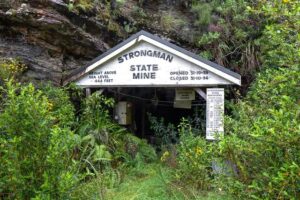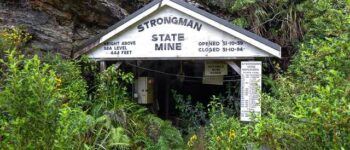1967: The Strongman Mine Disaster
January 19, 2024
By AHNZ
 The rescue attempt continued all night and the next day after a huge explosion within the Government’s Strongman Mine on the West Coast today in history, 19 January, 1967.
The rescue attempt continued all night and the next day after a huge explosion within the Government’s Strongman Mine on the West Coast today in history, 19 January, 1967.
An official inquiry found that the state-run coal mine had neglected safety procedures. 240 men were in the path of a deadly fireball that, by luck, was stopped by a damp part of the tunnel. 19 Were killed, 17 bodies recovered.
The inquiry into the disaster concluded that at least two mining regulations had been broken. The government was ordered to pay compensation to the families of the victims.
The mine was officially opened on 31 October, 1939 by Labour 1.0 Minister for Mines Paddy Webb. A Government operation from the start. Webb was, in a sense, the first miner to ever be Minister for Mines however in another sense he was really an Australian Communist agitator whose support base involved miners. State control of coal in New Zealand reached its peak in 1948 when Labour 1.0 nationalised all coal deposits in the country. This was reversed by National 1.0 when they came into office shortly after.
Also there on the day was Charles Strongman who served as first manager of the mine. As I also see that the Denniston mine was named after its first manager it appears to be the custom to name mines this way sometimes. The mine had actually been open for months before but labour disputes prevented or delayed the formal opening until late in the year.
Mr Strongman served a high rank in the government, including Superintendent of State Coal Mines. Interestingly, he also died in 1967 at the age of 82. Ref. National Library
“The funeral was held on Sunday for the fifteen miners recovered from the mine and Greymouth florists had to buy out the entire Christchurch flower market for two days to meet the huge order for wreaths…The day dawned wet as hundreds assembled early outside the St John’s Presbyterian Church where the combined Protestant service for ten of the dead miners was held. It was packed to overflowing while 1,000 people listened to the service from loud speakers in the church tower.” – Kokshoorn (2011)
“How dare they go in there and get the bodies out straight after the explosion…They should have waited and done nothing and then sued the first responders who went in there to help their mates.. On the plus side we got two of the greatest solo marathon performances ever out of it. Dave McKenzie’s brother Hec was one of the 19 killed. A few days after the explosion he ran the Canterbury Champs in 2:16.02. Two months later he won the Boston Marathon in a course record 2:15.45. Both races run for Hec.” – Don Jacobs, comment to AHNZ (2023)
“Dad said the gas reports that were recorded in the book went missing someone ripe them out.” – Ian A Cox, West Coast Recollect, Facebook (2018)
“The safety record was not impeccable, the standards for reporting were altered by the govt to suit WW2 production needs. Coal was first, humans second…” – Lee Williams, West Coast Recollect, Facebook (2018)
“If not for the wet area quenching the blast, the toll would have been extreme. My Father, Jim Adamson, was manager during WWII. He was really very upset and saddened to hear of the tragedy, “What have the silly buggers gone and done?” So very sad.” – David Adamson, West Coast Recollect, Facebook (2018)
By contrast in the current era our culture insists on not responding to rescue and recover. For example, at Pike River. Ref. 2010: Pike River Mine Disaster, AHNZ
Those who do act can even be prosecuted! When White Island blew on 9 December 2019, killing 22, it was placed off-limits along with a Maori rahui being placed on it. Yet, within 30 days of the 1956 eruption a team of 9 DSIR scientists didn’t just visit, they lived on the island. Ref. 1956: White Island Expedition, AHNZ
It’s also remarkable how in earlier times a more connected New Zealand prompted a huge funeral and grief that rippled through everyone and they physically turned up to the memorial.
—
Image ref. Te Ara Flickr Pool, Digital NZ
Ref. p383, The Golden Grey, Tony Kokshoorn (2011)
3 thoughts on "1967: The Strongman Mine Disaster"
Leave a Reply
 Like Comment Share
Like Comment Share






Makes one wonder if better could have been done at Pike River. The “Woke” rabble have a lot to answer for.
Femminisation of our culture perhaps?
Of course. Different era. My answer, and Cato’s, is that masculine/feminine energy is out of balance. Too much feminine at the top means over-protective rules; Safety-ism.
Check this out…
https://www.facebook.com/watch/?v=888114406135029